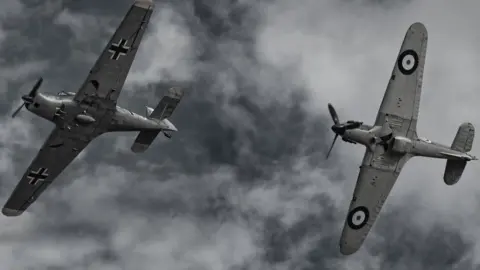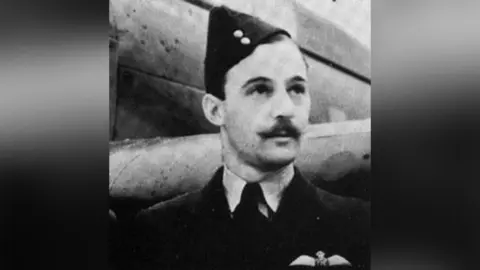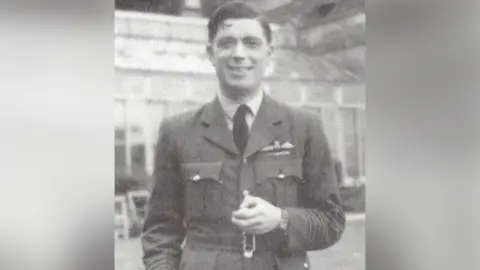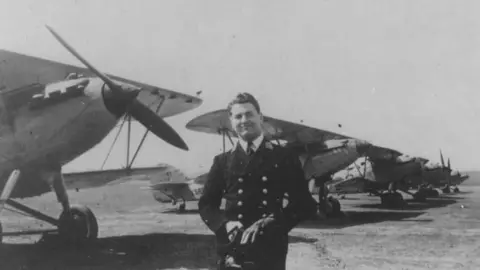Battle of Britain: 'The few' remembered on 80th anniversary
 Getty Images
Getty ImagesEighty years ago the men who would become known as "the few" took to the skies to defend Britain from the Luftwaffe.
While 15 September is commemorated as Battle of Britain Day, it actually took place from 10 July to 31 October 1940.
Germany's objective was to force Britain to agree to a negotiated peace settlement.
But on 15 September 1940, RAF Fighter Command claimed what proved to be a decisive victory over the Nazis.
On that day two massive waves of German attacks were fought off while 60 German and 26 RAF planes were shot down.
Wing Commander Frederick William Higginson, of 56 Squadron, was known as Taffy by his colleagues.
His son, Phil, said the Hurricane pilot shot down "13-and-a-half" German planes after joining the RAF.
Among them was a Dornier 17 bomber which he brought down over Bournemouth during the Battle of Britain.
 Battle of Britain Memorial Trust
Battle of Britain Memorial Trust "The half was because two of them shot the same plane," Phil, a 65-year-old teacher from Pembrokeshire, said.
"He was shot down four times during the war, twice over France, where he was captured and escaped.
"He enjoyed flying and often said he felt sorry for soldiers who had to engage on the ground."
Wing Cdr Higginson died aged 89 in 2003.
On the 60th anniversary he said in an interview he was "one of the lucky ones".
"There can be no doubt the Battle of Britain did change the course of the war," he said.
"I'm not claiming I did anything particularly brave, but we all pulled together because we had such a real fear of invasion."
David Rosier's father was Wrexham-born Frederick Ernest Rosier.
He led 229 Squadron in September 1940 and later rose to become Air Chief Marshal Rosier and was knighted.
 Battle of Britain Memorial Trust
Battle of Britain Memorial Trust "He was leading 229 Squadron and went off every day on patrol intercepting Germans," David said.
"They went up at least twice a day, two or three times a day, not generally at night.
"He would always say he played a fairly minor part because he did not go all the way through the Battle of Britain."
That was because he was shot down by a Messerschmitt on 18 May 1940 during operations over Dunkirk - before the battle began.
"His plane was on fire," said David.
"He tried to get out but the cockpit was jammed and he could not slide it back. The plane blew up and he found himself in mid-air.
"He pulled his parachute and came down in flames."
On getting back to England he was sent to recover from his burns in hospital in Dorset.
"Generally people would say he did his bit," David said.
Sir Frederick died in Llangollen aged 82 on 10 September 1998.
 family photo
family photoTom Carpenter's uncle, Sub Lt Jack Conway Carpenter, was one the Canadians who fought in the battle.
A navy pilot whose family were from Llanfaethlu, Anglesey, he was attached to the RAF.
He first joined 229 Squadron, then 46 Squadron, and was just 22 when he died after being shot down on 5 September 1940.
Two days earlier, he had shot down a Messerschmitt near North Weald, Essex.
"When he was shot down and bailed out his plane was never found," said Tom.
His uncle received a sea burial off Borthwen Beach, near Holyhead, on 16 September 1940.
Tom said his family are "immensely proud of him."
An event to commemorate the 80th anniversary will take place in Cardiff in July 2021 - postponed from this year because of coronavirus.
Air Commodore Adrian Williams is Wales' most senior RAF Officer.
He said: "In this 80th year commemoration of the battle, we remember the "Welsh few", 67 men from all corners of Wales, who served with distinction in the air and made a significant and gallant contribution to the Battle of Britain.
"They were among the 2,947 aircrew from Britain, the Commonwealth and many other countries who fought in the battle.
"We remember too, the vital part played by RAF training bases in Wales in supplying pilots in that desperate struggle during the long hot Summer of 1940."
Wales' first minister, Mark Drakeford, paid tribute to those who played "a vital role" in protecting Britain and the Commonwealth during the Battle of Britain.
"We pay tribute to all those involved in the campaign - the pilots and aircrew, the Women's Auxiliary Air Force, the Observer Corps, local volunteers and all those working in the mines, factories, and industry to keep the effort going.
"We remember the 544 pilots who paid the ultimate sacrifice and all those who contributed to the major air campaign.
"They gave their today for our tomorrow."
